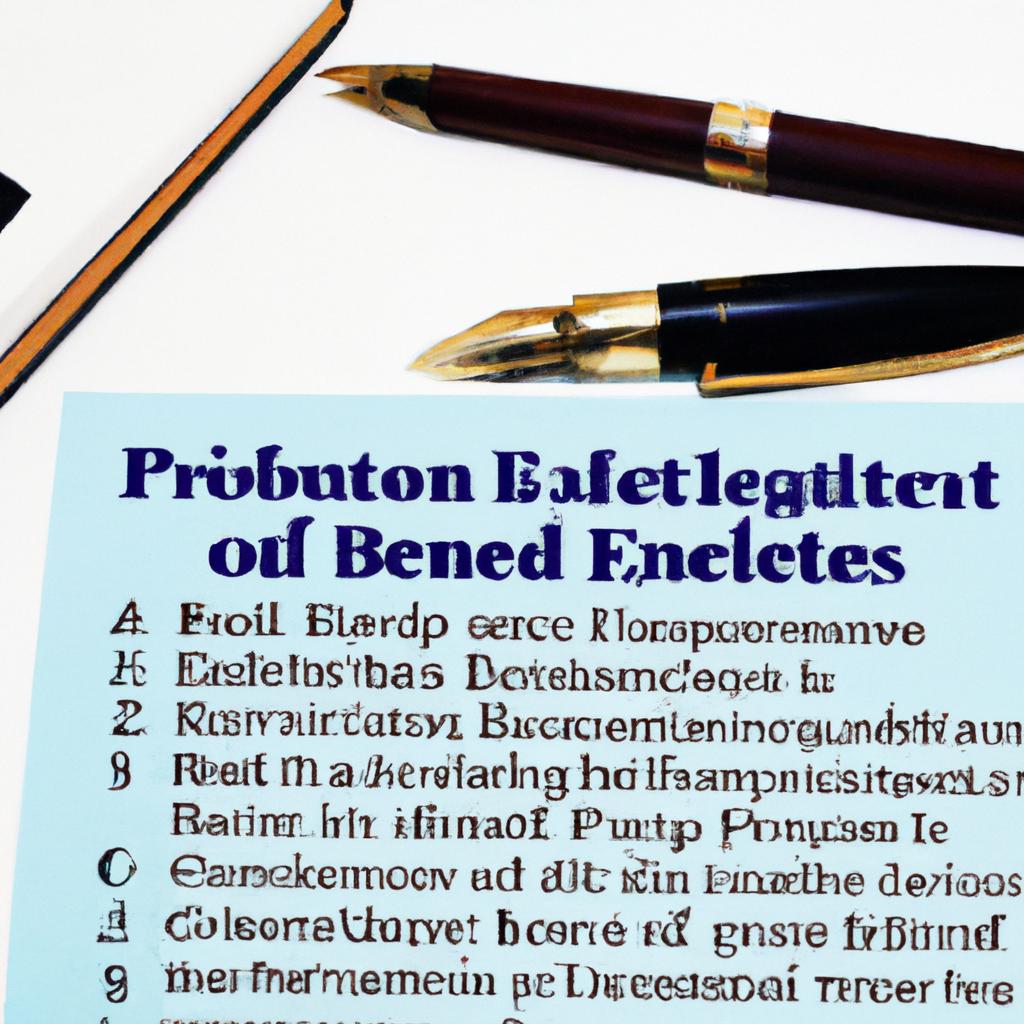As members of the legal profession, we often encounter complex and nuanced terms that may be unfamiliar to those outside the field. One such term that frequently arises in the realm of estate planning is “probate sale.” In this article, we will delve into the meaning of probate sale, exploring its implications and significance within the legal landscape. Join us as we unravel the intricacies of this concept and shed light on its importance in the realm of estate administration.
Understanding the Concept of Probate Sale in Estate Planning
When it comes to estate planning, it is crucial to understand the concept of probate sale. Probate is the legal process through which a deceased person’s assets are distributed to heirs and beneficiaries. A probate sale occurs when a property owned by the deceased needs to be sold in order to distribute the proceeds to the heirs. This process can be complex and time-consuming, so it is important to seek the assistance of a knowledgeable estate planning attorney to guide you through the probate sale.
In a probate sale, the property is typically sold at fair market value to ensure that the heirs receive their rightful share of the deceased’s estate. The proceeds from the sale are then used to settle any outstanding debts and distribute the remaining assets to the beneficiaries. It is important to note that the probate process can vary depending on the state in which the deceased resided, so it is essential to work with a lawyer who is well-versed in probate laws in your jurisdiction. At Morgan Legal Group, we have extensive experience with probate sales and estate planning, and we are here to help you navigate the complexities of the probate process.

Key Considerations for Executors and Beneficiaries in Probate Sales
When it comes to probate sales, there are key considerations that both executors and beneficiaries need to keep in mind throughout the process. Executors, as the individuals responsible for carrying out the deceased’s wishes and managing their estate, must ensure that all legal requirements are met and that the sale proceeds according to the probate court’s instructions.
For beneficiaries, understanding the probate sale meaning is crucial in order to navigate the process smoothly and maximize their benefits. It is important for both parties to work together in a respectful and transparent manner to ensure a successful probate sale that honors the wishes of the deceased.

Navigating the Legal Process: Important Steps in a Probate Sale
When it comes to understanding the intricacies of a probate sale, it is essential to grasp the meaning behind this legal process. A probate sale refers to the sale of real estate property that occurs through the probate court system after the homeowner has passed away. This process is necessary when the deceased individual did not leave a will or when the will does not specify how the property should be distributed.
During a probate sale, several important steps must be followed to ensure that the property is transferred smoothly and legally. These steps include identifying and appraising the property, notifying heirs and creditors, obtaining court approval for the sale, and ultimately closing the transaction. It is crucial to seek the guidance of a knowledgeable probate attorney to navigate through the complex legal requirements and ensure that the probate sale is conducted properly and in compliance with the law.

Expert Recommendations for Maximizing Value in a Probate Sale Transaction
If you’re involved in a probate sale transaction, it’s crucial to understand the process and how to maximize its value. Our experts at Morgan Legal Group recommend the following strategies for a successful probate sale:
1. Properly value the property
It’s essential to get a professional appraisal to determine the accurate value of the property. This will ensure that you’re getting a fair price and avoid any disputes during the sale process.
- Conduct a competitive market analysis
- Consider any special circumstances or unique features of the property
2. Maintain the property
Keeping the property well-maintained can significantly increase its value. Make necessary repairs, clean up the property, and consider staging it to attract potential buyers. A well-maintained property is more likely to sell quickly and at a higher price.
Q&A
Q: What is a probate sale?
A: A probate sale is the process in which a deceased person’s assets, such as real estate, are sold to settle their debts and distribute the remaining funds to heirs or beneficiaries.
Q: Why does probate sale occur?
A: Probate sale occurs when a person dies without a will or trust, or when their estate is not fully covered by a will. The court oversees the sale to ensure that all creditors are paid and the remaining assets are distributed fairly.
Q: What types of assets are typically sold in a probate sale?
A: Assets that are commonly sold in a probate sale include real estate, personal belongings, stocks, bonds, and any other investments or valuable items owned by the deceased.
Q: How does the probate sale process work?
A: The probate sale process begins with the court appointing an executor or personal representative to manage the sale of the assets. The executor is responsible for appraising the assets, listing them for sale, negotiating offers, and distributing the proceeds to creditors and beneficiaries.
Q: What are the benefits of a probate sale for buyers?
A: Buyers can often find properties at a lower price in a probate sale, as the seller is motivated to sell quickly to settle debts and distribute the proceeds. Additionally, buyers may have more negotiating power in a probate sale due to the unique circumstances of the transaction.
Q: Are there any downsides to purchasing property in a probate sale?
A: One potential downside of purchasing property in a probate sale is that the process can be lengthy and complex, as it is subject to court approval. Buyers may also encounter issues with the title or condition of the property that could affect its value or marketability.
Future Outlook
In conclusion, understanding the meaning of probate sale is crucial for anyone navigating the process of settling an estate. Whether you are a buyer looking for a potential bargain or an heir anticipating the finalization of a loved one’s affairs, being informed about probate sales can help you make more confident decisions. By demystifying this often complex and intimidating legal procedure, you can ensure a smoother and more efficient transition of assets. So, next time you come across the term probate sale, you can feel empowered with knowledge and ready to take on whatever lies ahead.
 Probate Sale Meaning: Understanding the Process and Its Benefits
Probate Sale Meaning: Understanding the Process and Its Benefits
When a loved one passes away, the last thing their family wants is to be bogged down with legal procedures. However, unfortunately, death comes with its own set of complications, and one of them is the process of probate sale. But what exactly is probate sale, and why is it necessary? In this article, we will delve into the meaning of probate sale, the steps involved, and its benefits to help you better understand the process.
What is Probate Sale?
Probate sale, also known as a probate court auction, is a legal process where a deceased person’s property is sold to pay off their outstanding debts and distribute assets to rightful heirs. It is initiated by the executor of the deceased person’s estate, who is responsible for managing their affairs after their passing.
When a person dies, their assets and debts become part of their estate. The probate process determines the legal ownership of these assets and makes sure that the decedent’s debts are paid off using the proceeds from the sale of their property. This process helps ensure that all creditors and beneficiaries are treated fairly and that the decedent’s wishes for their estate are fulfilled.
Steps Involved in Probate Sale
The probate sale process can vary depending on the state in which the deceased person resided at the time of their death. However, here are the general steps involved in a probate sale:
1. File a Petition for Probate: The executor of the estate must file a petition for probate with the probate court in the county where the deceased person lived. This petition initiates the probate process.
2. Gather Information on Assets and Debts: The executor needs to gather information about the deceased person’s assets and debts to determine the value of the estate. This includes bank accounts, investments, real estate, and any outstanding loans or mortgages.
3. Notify Creditors and Beneficiaries: The executor must notify all creditors and beneficiaries of the deceased person’s passing and the opening of the probate case.
4. Appraise the Property: The court may require an appraisal of the property to determine its fair market value.
5. Pay Debts: The executor must use the proceeds from the sale of the property to pay off any outstanding debts, including funeral expenses, taxes, and creditors.
6. Sell the Property: Once all debts have been paid, the executor can proceed with the sale of the property through a probate court auction.
7. Distribute Assets to Beneficiaries: After the property has been sold and the debts have been paid, the remaining proceeds will be distributed to any beneficiaries named in the will.
Benefits of Probate Sale
The probate process may seem daunting and time-consuming, but it serves several important purposes. Here are some benefits of the probate sale process:
1. Protection Against Mismanagement: The probate sale process provides checks and balances to ensure that the executor of the estate is fulfilling their fiduciary duties and not mishandling the assets or funds.
2. Settle Debts: Probate sale ensures that the deceased person’s debts are paid off using the proceeds from the sale of their property. This helps protect the family from any potential legal action from creditors.
3. Fair Distribution: The probate process ensures that the assets are distributed fairly among the beneficiaries, as dictated by the will or state laws.
4. Clear Title: Selling a property through the probate process guarantees that the title is clear and marketable, giving the buyers peace of mind in their purchase.
Practical Tips for Probate Sale
Dealing with the death of a loved one can be overwhelming, and handling the probate process on top of that can seem like an added burden. Here are some practical tips to make the probate sale process smoother:
1. Hire an Experienced Probate Attorney: The probate sale process is a complex legal matter. Having an experienced probate attorney can help navigate the process and ensure that everything is done according to the law.
2. Be Organized: Keep all financial and legal documents related to the deceased person’s estate in one place. This will make it easier for the executor to locate important information during the probate process.
3. Communicate with Beneficiaries: Clear communication with the beneficiaries of the estate is essential to avoid any conflict or misunderstandings. Keep them updated on the progress of the probate process to avoid any surprises.
Real-Life Case Studies
Mary’s father passed away, leaving behind a house and some savings accounts. To fulfill her father’s wishes, Mary had to go through the probate process to sell the house and distribute the proceeds to her and her two siblings. With the help of a probate attorney, the process went smoothly, and the property was sold at a probate court auction. The siblings were happy with the fair distribution of assets, and Mary was relieved to fulfill her father’s wishes.
In another case, John’s father passed away, leaving behind a significant amount of debt. As the executor of his father’s estate, John was responsible for paying off the debts using the proceeds from the sale of the property. However, John had to go through a lengthy legal battle with his late father’s creditors, who were seeking to collect their debts from the estate. In this case, having an experienced probate attorney helped John protect the estate and distribute the assets according to his father’s wishes.
In Conclusion
Probate sale may seem like a complicated and time-consuming process, but it serves a crucial purpose in protecting the interests of the decedent’s creditors and beneficiaries. The process is designed to ensure that the distribution of assets and the settlement of debts is fair and in accordance with the law. By understanding the meaning and steps involved in probate sale, you can better navigate this process and ensure a smooth, lawful distribution of assets.


